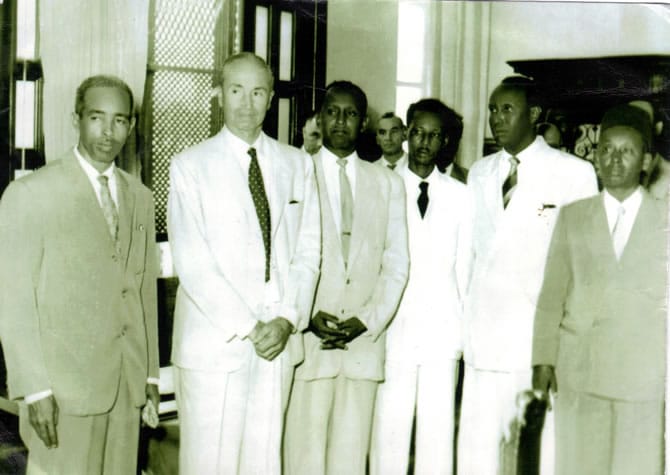Sheikh Ali Giumale, the only child of Giumale Barale and Ghedia Roble was born in 1905 in the village of Omaad, near Belet Uen. The son of a village herdsman, he moved to Mogadiscio where he attended Quran School before enrolling in the government run schools. In 1934 he joined the colonial troops, known as “Dubat”. He took part in the Italo-Abyssinian war, and within two years he reached the rank of “Capo Banda”, the highest military rank a native soldier in the “Dubat” contingent could reach. In 1938, at his request, he left the Italian military forces to serve in the Civil Affair Department of the Italian colonial administration. He was first based in Wardeer, and later transferred to Qabridarre as senior interpreter. Following the British Military Occupation of Somalia, he established his own commercial business in Belet Uen

Ali Grumale’s long political career started in 1946 when he became member of the Somali Youth Club, the precursor of the Somali Youth League (SYL), Belet Uen branch.
From 1946 to 1955 he served, several times, as Secretary of the local branch of the party in Belet Uen.
From January 1953 to March 1956 he represented Hiran region at the Territorial Council (Consiglio Teritoriale), a consultative Council advicing the trusteeship Administration on domestic policy
In March 1956, following the first political elections in Somalia, he was elected Member of Parliament for the electoral district of Belet Uen..
From May 1956 to July 1959 he served as Minister of Social Affairs (Ministro per gli Affari Sociali);
From July 1959 to August 13, 1960, he served as Minister of Health, Labour and Veterinary Service.
From August 13, 1960 to November 30, 1961 he served again as Minister of Health, Labour and Veterinary Services.
On November 30, 1961, Sceikh Ali Giumale was relieved of his duties following long standing feud with the Prime Minister, Abdirascid Ali Scermarche. Giumale’s removal sparked off a widespread protest in the Hiran Region, particularly in his political stronghold of Belet Uen, where people clamoured against their Minister’s dismissal. Messages of solidarity came particularly from paramount chiefs, notables and religious leaders, as well as from SYL branches in Belet Uen and Bulo Burti; these messages accused the Prime Minister of allegedly practicing tribalism. The dismissal of the Minister raised also security concerns to the point that the Minister of the Interior of the time, Abdirazak Haji, paid an unannounced visit to Belet Uen. The Minister took a tough line, warning the public in Bulo Burti and Belet Uen that the government would take grave measures against those who, in solidarity with Sheikh Ali Giumale, may stir up trouble in the region.
Sheikh Ali Giumale was known for his active participation in the debates taken place in the Parliament, irrespective of whether he was member of the ruling party or in the opposition ranks. He never lost touch with his roots and electoral base. A shrewd politician with powerful oratory, well capable of captivating his audience, Giumale saw his popularity sky-rocket when campaigning against the referendum on the Constitution in 1961, the ‘no’ vote outnumbering the ‘yes’ in Hiran region.
In 1962, Sheikh Ali Giumale, together with a number of other long time SYl associates, quit the party to establish a new opposition party they called Somali National Congress (SNC) The new party won 22 seats in the 1964 general elections.
The man whose close friends referred to him as “Il Duca del Hiran” (‘The Duke of Hiran’), passed away at Belet Uen on November 24, 1979.. That day, Belet Uen mourned the death of its distinguished son. I was among the thousands who gathered at the burial site to bid farewell to the great man.
Mohamed Trunji
e-mail: trunji@yahoo.co